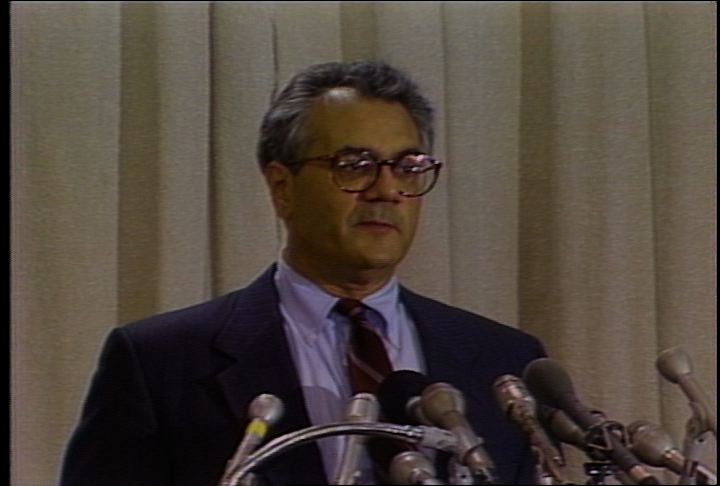
Description:
David Boeri reports on the Bank of Boston's new mortgage program for low- and moderate-income city residents. President of Bank of Boston Ira Stepanian and Robert Mahoney announcing the new program to the media at a press conference at a Roxbury branch of the Bank of Boston. Boeri reviews the terms of the program. He notes that many houses in the area are not eligible for the program because their sale prices are too high. Interview with Roxbury resident Diana Strother, who says that many residents do not make enough money to take advantage of the program. Interview with Leon Wilson from the Bank of Boston about the terms of mortgages under the program. Boeri notes that the units in the Fort Hill condominium complex are too expensive to qualify for the Bank of Boston program. Interview with Boston resident Alvin Wilkins and realtor Eve Moss about housing prices in the area. Interview with Bruce Marks from the Hotel and Restaurant Workers Union. Marks calls the Bank of Boston program a "public relations scam" if it does not truly help low-income residents with followup steps.
1:00:03: Visual: Footage of Ira Stepanian (President, Bank of Boston) speaking to the media at a Roxbury branch of the Bank of Boston. Stepanian says that the Bank of Boston would like to help to solve some of the city's problems. Shots of media and audience members listening to Stepanian. David Boeri reports that Stepanian talked about the Bank of Boston's new mortgage program for city residents. Boeri notes that the new program is called First Step With Rate Advantage. Boeri describes the terms of the mortgages offered under the program. Boeri reports that the first year's rate is 8.65%; that the maximum purchase price cannot exceed $140,000 for a single unit; that the maximum purchase price cannot exceed $185,000 for a two-family home; that the maximum purchase price cannot exceed $225,000 for a three-family home. Boeri notes that individuals making $35,000 or less are eligible for the program; that families making $45,000 or less are eligible. V: On-screen text details the terms of the mortgages offered under the program. Footage of Robert Mahoney (Bank of Boston) addressing the audience at the Roxbury branch of the bank. Mahoney says that the program serves the needs of a certain segment of the population. Shots of African American women in the audience. Boeri notes that some Roxbury residents say that the program is out of reach for them. V: Footage of Diana Strother (Roxbury resident) saying that Roxbury residents pay the highest rents in the city; that the average income in Roxbury is $15,000. Strothers says that most Roxbury residents do not make enough to take advantage of the program. Footage of Leon Wilson (Bank of Boston) being interviewed by Boeri. Boeri notes that it is difficult to find a house for $140,000 in this neighborhood. Boeri asks about monthly mortgage payment on a $140,000 house. Wilson says that residents would pay $1,100 per month if they made a downpayment of $14,000. Boeri reports that it is hard to find houses which meet the eligibility requirements of the program. V: Shot of a condominium complex in Fort Hill with units for sale. Shot of Boeri talking to a small group of people on the front porch of one of the Fort Hill condominium buildings. Boeri notes that condominium units in a Fort Hill development are selling between $149,000 and $165,000. Boeri notes that the condominiums do not meet the eligibility requirements of the Bank of Boston program; that the condominiums are not affordable for many residents. V: Shot of homes on a residential street. Footage of Alvin Wilkins (Boston resident) being interviewed by Boeri. Boeri asks Wilkins if it is possible to find homes for $140,000 in the area. Wilkins says that homes selling at $140,000 need a lot of repair. Wilkins says that it is impossible to find a home which is ready to move in to at that price. Footage of Eve Moss (realtor) saying that the average mortgage payment for one of the Fort Hill condominiums is $1,200. Moss says that it is difficult to make those mortgage payments on a salary of $45,000 or less. Footage of Wilson saying that the Bank of Boston is trying to provide an opportunity for some people to own a home. Footage of Bruce Marks (Hotel and Restaurant Workers Union) says that the Bank of Boston is pulling a public relations scam if they are trying to bill the program as an example of a low- and moderate-income home ownership program. Marks says that he would like to see a program which is truly aimed at low- and moderate-income people. Footage of Mahoney addressing the audience at a Roxbury branch of Bank of Boston. Boeri reports that many hope the program's next step will be a bigger one.
Date Created:
05/10/1989












